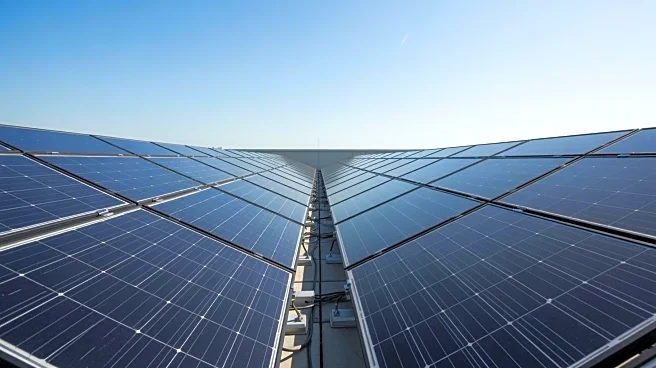What's Happening?
Wealthy Nigerians are increasingly importing Chinese solar panels due to persistent failures in the national power grid. Ebipere K. Clark, an energy consultant, highlights that the unreliable electricity supply is driving affluent individuals to seek
energy security through solar solutions. This trend is not only prevalent among residential customers but also commercial and industrial sectors. Despite the potential for local solar manufacturing, Nigeria faces challenges such as limited water and energy resources, which hinder competition with established Chinese producers. The country, with its significant self-generation capacity, presents a large market for generator replacement, yet continues to rely heavily on imports due to supply chain constraints.
Why It's Important?
The shift towards solar energy in Nigeria underscores the critical need for reliable electricity solutions in a country where a significant portion of the population lacks access to power. This development could stimulate local manufacturing and job creation, although current dependencies on imports highlight infrastructural and resource challenges. The reliance on Chinese solar panels reflects broader economic implications, including potential growth in the renewable energy sector and the need for policy adjustments to support domestic production. The situation also emphasizes the importance of energy security in driving economic stability and development.
What's Next?
Efforts to establish local solar panel manufacturing are underway, aiming to expand energy access and create employment opportunities. However, Nigeria must address infrastructural challenges and develop supporting industries to reduce dependency on imports. The government and private sector may need to collaborate on policy frameworks that incentivize local production and investment in renewable energy. As the demand for solar panels grows, stakeholders might explore partnerships to enhance technology transfer and skill development, potentially positioning Nigeria as a key player in Africa's renewable energy market.
Beyond the Headlines
The reliance on solar panels highlights broader issues of energy inequality and the need for sustainable solutions in Nigeria. The country's energy crisis could drive innovation and investment in alternative energy sources, potentially leading to long-term shifts in energy policy and infrastructure development. Ethical considerations regarding environmental impact and resource management may also arise as Nigeria navigates its energy transition.
















